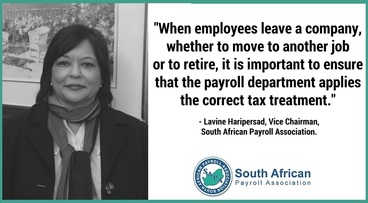 When changing jobs or retiring, it is very important to ensure that the correct tax treatment is applied—or both employer and employee could find themselves at risk. Author: Lavine Haripersad, Vice Chairman, South African Payroll Association When employees leave a company, whether to move to another job or to retire, it is important to ensure that the payroll department applies the correct tax treatment. Typically, the reason for the employee leaving determines the way the final payments are treated by the taxman. Failure to apply the correct principles could make the company vulnerable to penalties from SARS, and the employee could find him- or herself having to make arrangements to pay back some money to SARS on assessment Reasons for leaving If one looks at the most common reasons for people leaving their current employer, it becomes easier to understand the type of tax regime that should be applied. Employees should make it their business to understand the broad principles and raise any queries, in order to avoid having to make unexpected repayments later. Reasons for departure include: • Resignation. When an employee resigns, his or her final payment will typically include a pay-out for any untaken leave, pro rata bonuses and notice pay, if applicable. These payments are subject to normal income tax, and the payroll department does not need to obtain a tax directive. • Operational requirements. This covers both retrenchment and redundancy, both of which result from the operating conditions in which the company finds itself. In the case of redundancy and retrenchment, HR has to apply the rules prescribed in the Labour Relations Act, 66 of 1995, which requires the employer to make a severance payment of (a minimum of) one week’s pay for every completed year of service. For tax purposes, this redundancy lump sum payment must be treated as a retirement lump sum payment. A portion of this lump sum is free of tax (although this will be affected by any previous lump sum benefits obtained). In order to obtain this highly desirable benefit, the employer must first obtain a tax directive from SARS. The tax regime in respect of these severance pay-outs is that the first R500 000 is not subject to tax, the next R200 000 is taxed at 18 percent, the subsequent R350 000 at 27 percent, and all amounts above R1 050 000 at 36 percent. As already noted, these figures have to take into account any previous benefits claimed during prior redundancies. Most importantly, it must be remembered that notice pay, leave pay and pro rata bonuses that are also paid at the time of termination are not part of the severance benefit, and are subject to normal tax. • Mutually agreed separation. When the relationship between employer and employee breaks down, the parties might agree to an amicable parting of the ways to avoid legal disputes. In such cases, a gratuity or final settlement payment is usually made. It will usually be determined following the guidelines for retrenchment packages in Section 41 of the Basic Conditions of Employment Act. The critical point to note here is that because this payment is not made on the basis of operational requirements, it does not constitute a severance benefit. Thus, a portion of this payment may not be treated as a tax-free pay-out, as in the case of a severance for operational requirements. This means that the mutual separation gratuity will be treated as part of the employee’s normal remuneration, and will thus be taxed as such. What can you do? In conclusion, let us stress two points. The first is the one already made, namely that the reason for the termination of the employment relationship will determine how the final payment will be taxed. While the onus is on the employer to ensure that the correct tax regime is followed, if the employee has insufficient tax deducted, he or she will still be liable for the unpaid tax to be paid to SARS—even if the discrepancy only comes to light after some time has elapsed. If employees are unsure, they should first discuss the matter with the payroll department and, if necessary, consult an independent tax practitioner. The second point to emphasise is that to prevent mistakes happening, the traditional communications gap between HR and Payroll needs to be closed. Both parties should make active efforts to improve this situation because if HR makes the reasons for the termination absolutely clear, it is easier for Payroll to apply the correct tax regime. In the end, everybody will benefit, including the employees. ENDS MEDIA CONTACT: Idéle Prinsloo, 082 573 9219, [email protected], www.atthatpoint.co.za For more information on SAPA please visit: Website: http://www.sapayroll.co.za/ Twitter: @SAPayroll LinkedIn: The South African Payroll Association
0 Comments
Leave a Reply. |
Welcome to the South African Payroll Association newsroom.
Archives
July 2020
Categories
All
|

 RSS Feed
RSS Feed